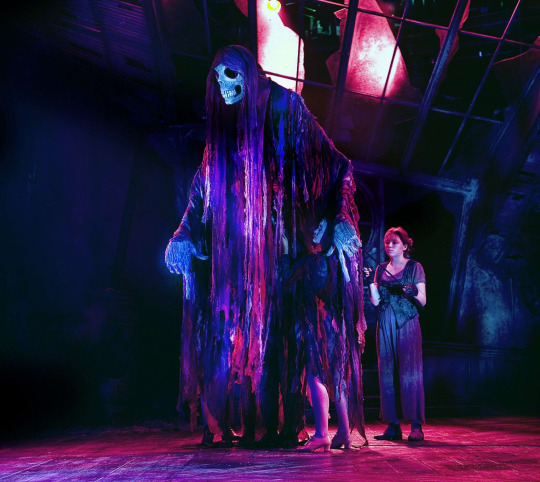#A Christmas Carol by Charles Dickens
Explore tagged Tumblr posts
Text
Free Christmas Carol Typeset

So I finished up and posted the last chapter of my fic yesterday, and thought I'd get back to doing some typesetting. Thus, here is A Christmas Carol by Charles Dickens, with the original 1843 illustrations by John Leech. Not imposed, sized for half letter (letter folio). Kept the title page relatively simple. I wanted to do something similar to the original 1843 title page.
Free typeset can be found here:
If you use any of my typesets, feel free to tag me! I love seeing what people make. And if any of these were helpful to you, please consider dropping a like/reblog if you can! You can also follow this blog for any future free typesets. (If there's any typesets you'd like to see for other public domain works, let me know! I'm always looking for suggestions. )
#A Christmas Carol by Charles Dickens#A Christmas Carol#Charles Dickens#ebenezer scrooge#typesets#typesetting#book design#bookbinding#book#free to use
28 notes
·
View notes
Text
WIBTA for taking advantage of my boss’ possible manic episode?
I know this already sounds bad but hear me out.
So I (30M) am the sole employee of this guy (62M) who’s honestly just a miserable boss and an even more miserable person. It sucks so bad working for him—the pay is horrendous, he’s verbally abusive, and the working conditions are awful (in the winter I literally have to stay bundled up the whole work day because he refuses to put the heat on in the office). He wouldn’t even give me holidays off if it wasn’t for the fact that there’s basically nothing to do those days because everywhere else is closed. I’m almost positive he unironically thinks poor people should die if they can’t work. His nephew (aka his only living relative and just the nicest guy) came by yesterday to invite him to Christmas dinner and he told him he’d see him in hell.
I cannot stress this enough—it’s BAD. I’d quit, but it’s been hard finding a better job and I’ve got four kids at home, including one with special needs.
Anyway, so here’s where I’m wondering if I’d be the asshole. Today was Christmas Day and he showed up at my house out of nowhere (huge red flag, I know). At first I thought he’d forgotten I had the day off and he was here to chew me out, which was worrying enough, but then his whole demeanor changed and he was super happy and excited and talking about how he was going to raise my salary. He even mentioned possibly making me a partner in the firm.
Now if that was it, I’d feel a little weird about the suddenness of it but it’d be fine. I’m not going to complain about having more money to feed my family. But then he started talking about how he wanted to pay our mortgage off. He talked about wanting to pay for our son to get the very expensive medical care that’s probably going to save his life. He mentioned at one point that he was going to be donating a huge amount of money to charity too—I knew he was rich but it staggered me. All this from a guy who doesn’t (didn’t?) even want to turn on the heat or the lights because it costs too much money.
It was such a sudden and drastic change that happened very literally overnight and now I’m kind of concerned he’s having a manic episode or something. I really, really want to accept his sudden generosity (I probably will; my wife is all for it and thinks he owes it to us), and I would love to believe that he’s truly had a sudden change of heart (an actual Christmas miracle lol) but I’m just worried about the possible consequences of accepting huge financial gifts like this from someone who I believe might be experiencing some kind of break from reality. Even if there’s nothing legally wrong with it, I’m worried about the ethics of it.
TLDR, my asshole boss might be in the middle of a mental breakdown. WIBTA if I accepted his offer to pay off my mortgage and my son’s medical expenses?
#a christmas carol#charles dickens#the muppet christmas carol#watched this last night and we were discussing how it must be like to be Bob Cratchit on Christmas morning lol#personal#erika's blog and bar
28K notes
·
View notes
Text

Scares the Dickens out them. 😳
#deny defend depose#deny#defend#depose#bullets#uhc ceo#ceo shooter#ceo#ceo shooting#united healthcare#uhc#a christmas carol#charles dickens#3 spirits#ghosts#meme#memes#funny memes#health care#health care memes#health insurance#us politics#american politics#USpol
12K notes
·
View notes
Text
"Scrooge only changed because he saw how nobody mourned him after his death" NO NO NO NO. You don't get it! The last spirit only worked because of the spirits that came before softening him up! If the spirits had shown him dead and ungrieved only it would not work. As the night goes on amid the visits Scrooge is already visibly changing. He's different after the first spirit and even more so after the second. And it's because of how much he's already changed that the final spirit is able to succeed
14K notes
·
View notes
Text


The Ghost of Christmas Yet to Come from A Christmas Carol at Chichester Festival Theatre
#the ghost of christmas yet to come#the ghost of christmas future#a christmas carol#charles dickens#theatre#chichester festival theatre
8K notes
·
View notes
Text
A Christmas Carol by Charles Dickens

"A Christmas Carol" by Charles Dickens is a timeless masterpiece that has become synonymous with the spirit of Christmas. Published in 1843, this novella tells the transformative tale of Ebenezer Scrooge, a miserly old man who is visited by the ghosts of Christmas Past, Present, and Yet to Come.
Dickens weaves a poignant narrative that combines social commentary with a powerful message of redemption and compassion. Through vivid characters and evocative descriptions, the author takes readers on a journey through Scrooge's life, exploring the consequences of greed and the potential for personal and societal change.

The enduring appeal of "A Christmas Carol" lies not only in its exploration of the holiday themes but also in its profound insights into the human condition. The story's impact is heightened by Dickens' skillful use of language, creating a vivid portrayal of Victorian London and the characters who inhabit it.
This classic has proven to be more than just a Christmas story; it is a timeless exploration of the importance of kindness, generosity, and the capacity for individuals to change for the better. "A Christmas Carol" remains a beloved and relevant work that continues to resonate with readers of all ages, reminding us of the true meaning of the holiday season.
Read now or download (free!)
Read online (web)
EPUB3 (E-readers incl. Send-to-Kindle)
EPUB (older E-readers)
EPUB (no images, older E-readers)
Kindle
older Kindles
0 notes
Text
you know what's funny about the all the supportive internet commentary re: the murdered health insurance exec? it's weirdly reminiscent of that scene in A Christmas Carol where the ghost of Christmas future shows Scrooge all those people who are bad-mouthing him after his death
like...bizarrely reminiscent
2K notes
·
View notes
Text

A holiday classic!
#nyaart#muppets#a muppet christmas carol#charles ‘gonzo’ dickens#rizzo the rat#tiny tim#watercolor#sketchbook
985 notes
·
View notes
Text
A lot of Christians read A Christmas Carol and gloss right over the "pay workers a living wage" message and take away "not being merry on Christmas is a cardinal sin" instead.
#And then they use this for antisemitism#If you don't understand why a lot of non xtians and former xtians hate Christmas#Think about all the stories where not being sufficiently happy on Christmas is the sole problem to be solved in 22 minutes#we have multiple words of negative connotation just for people who don't like christmas#Christmas#a christmas carol#Charles Dickens#Chuckie Dick#post o' mine
2K notes
·
View notes
Text






Instagram credit: coffeesoakedpages
#beaconhill#beacon hill#boston#massachusetts#us#cozy places#cozy house#cozy#cozyblr#coffeeblr#bookblr#coffee shop#flowers aesthetic#flowerblr#literature#a christmas carol#charles dickens
3K notes
·
View notes
Text
So this chap turned up with a flashy screwdriver and a blue telephone booth thing—and next thing I know, I’m meeting Charles Dickens right before his famed NYC reading of A Christmas Carol…
Thanks for a great night Neil Gaiman and Molly Oldfield!

2K notes
·
View notes
Text
reverse A Christmas Carol where Charles Dickens is visited by eight spirits during Hanukkah to terrorize him into being normal about Jews
#a christmas carol#charles dickens#fagen the jew#ebenezer scrooge#jacob marley#hanukkah#christmas#jumblr
2K notes
·
View notes
Text

240 notes
·
View notes
Text

The Muppet Christmas Carol (1992)
#the muppet christmas carol#muppet christmas carol#gonzo#charles dickens#rizzo the rat#bean bunny#crash#knock over#the muppets#muppet#muppets#christmas#christmas movie#gif#muppet gif#muppets gif#gifs of puppets
246 notes
·
View notes
Text



A Christmas Carol
Art by Justin McElroy
#Comics#A Christmas Carol#Ghosts#Horror#Justin McElroy#Horror Comics#LIT#Books#Charles Dickens#Christmas
2K notes
·
View notes
Text

“God bless us, every one!” The Saturday Evening Post, December 15, 1934 Cover by Norman Rockwell
#christmas#a christmas carol#1934#1930s#norman rockwell#saturday evening post#the saturday evening post#vintage#art#illustration#painting#tiny tim#charles dickens
278 notes
·
View notes